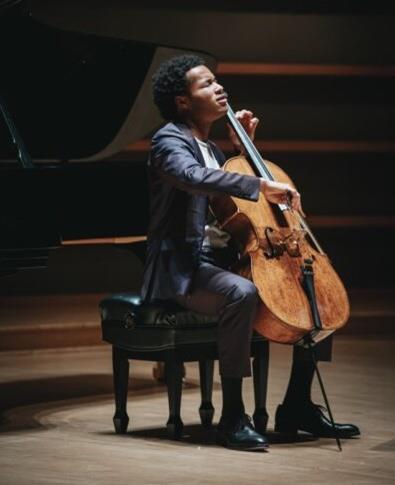Bruce Hodges listens to the performance of Bach, Britten, Simcock, Brouwer, Finnis and Cassadó at the Perelman Theater, Philadelphia, on 7 November 2023

Given the extraordinary cellists who have played Bach’s Cello Suite no.2 over the past few centuries since its rediscovery, something unusual is happening when it opens an evening – and the audience responds with a 30-second ovation. That happened at Sheku Kanneh-Mason’s concert, his first appearance at the Philadelphia Chamber Music Society in four years.
There are, of course, numerous ways of engaging with the suite. Kanneh-Mason proceeded to make it his own, creating an ever-probing narrative, with acutely judged dynamic contrasts ranging from the verge of inaudibility all the way to roaring lunges: I’ve never thought of this suite as a thrilling adventure until now. Britten’s First Cello Suite closed the opening half, with similar thoughtfulness and profundity, as Kanneh-Mason often seemed lost in delight at the composer’s constantly evolving landscape.
Watch: In the Green Room: Interview with Sheku and Isata Kanneh-Mason
Book review: The Sheku Kanneh-Mason Cello Collection
As the soft-spoken cellist introduced three works commissioned for him, a microphone might have been welcome. But when his 1700 Matteo Gofriller instrument sprang to life, its tone did the talking, blooming luxuriantly in the hall. All made strong impressions, starting with Prayer for the Senses (2022) by Welsh pianist/composer Gwilym Simcock, who nods to Bach with appealing contrapuntalism. Leo Brouwer’s Cello Sonata no.2 (2020), has roots in the Cuban composer’s guitar expertise, and this was followed by Five Preludes (2022) by Edmund Finnis, with the striking harmonics in no.4 being particularly memorable. The evening closed with Gaspar Cassadó’s Suite for Solo Cello (1926), a non-stop flood of virtuosity that again brought the capacity audience to its feet.
As an arrestingly non-traditional encore, the cellist put down his bow for a gentle, all-pizzicato version of ‘She Used to Call Me Dada’ by reggae legend Bob Marley.
BRUCE HODGES










































No comments yet